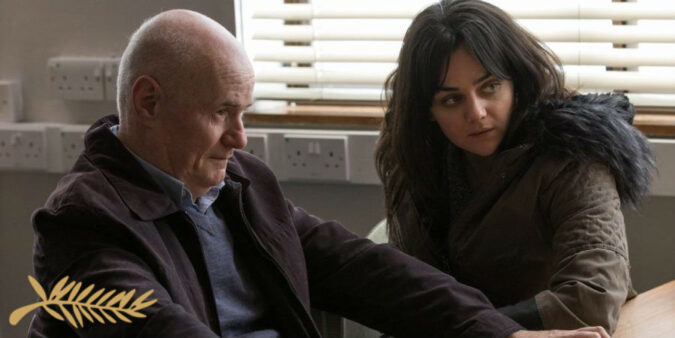We excitedly countdown to the 72nd Festival de Cannes with a different prize winning film each day.
I, Daniel Blake, 2016
Palme d’Or – Ken Loach
Prix du Jury Œcuménique Commendation – Ken Loach
Palm Dog Manitarian Award – Ken Loach’s three-legged dog Shea
Ken Loach is without any doubt a British icon. He is as well established in these parts as the North Yorkshire Moors and the White Cliffs of Dover. In film terms, his career has endured decades of the fluctuating tides of British cinema. A consistently affecting movie catalogue, unfilteringly portraying themes of social struggles, political movements, the British way of life, be it intimate or out in the big bad world.
Never, ever nominated for an Academy Award, Loach is something of a regular when it comes to the Cannes Film Festival. For forty years, the director has been back and forth between the English shores and the French Riviera. You’d have to dig deep into the festival’s history books to find a filmmaker that has landed films in Official Competition 12 times.
Read More: See the Official Competition Line-Up for Cannes 2019
That, of course, includes his appearance this year with Sorry We Missed You. Whoever shows up at the 2019 Cannes Film Festival – photographers, pass holders, acting talent, old or new – Loach is bound to get an extremely warm reception. Whether his new film has the potential for golden palm glory is yet to be seen. The Palme d’Or has come twice to Loach, both in the last fifteen years – The Wind that Shakes the Barley in 2006, and I, Daniel Blake in 2016.
Add to that three Jury Prizes (Hidden Agenda, 1990; Raining Stones, 1993; The Angels’ Share, 2012), three FIPRESCI Prizes (his first in his Cannes debut in 1979 for Black Jack), and five Prizes of the Ecumenical Jury – most notably a 30th Anniversary Prize for his entire body of work in 2004 – it’s an astonishing record. There was even a special Palm Dog award for the appearance of Loach’s own three-legged dog in I, Daniel Blake.
Ken Loach’s 2016 film, I, Daniel Blake, slipped under the radar somewhat during its run in Cannes. And many would agree it was a slightly surprising win, given the fine competition that year. There was, though, something poignant and raw that rang true with the Jury, and, indeed, audiences.
I know something of the welfare system in this country of England. An often infuriating loop-the-loop, procedures and forms to fill out over basic human rights and common sense reasoning. The structure is there for a reason though, to process entitlement, clamp down on fraud, and blah blah blah. But there are many who get caught in the cross-fire of the political ping-pong.
Read More: Cannes 72 Countdown – Graduation, 2016
Ken Loach’s overwhelming I, Daniel Blake zeros in on this very premise, watching a man with decency and willingness be dragged from pillar to post of the benefits systems. Some of the interactions between these regular people and members of the civil service in the film may appear harsh and disobliging. But it all rings very familiar alarm bells, this could well be a documentary that would be too-close-to-home for some.
Loach, along with screenwriter Paul Laverty, weave together a really exposing, under-the-surface view on this very real predicament. Of the ordinary world. At ground level, we experience these unfortunate characters mistreated and all-too-easily dismissed. And it’s so effortlessly affecting at times, nothing is forced down your throat, I was feeling genuinely pitying and saddening emotions.
As you rally for these people, there are moments of personal euphoria too. In particular when Daniel (Dave Johns) witnesses some rather unhelpful treatment of single mother Katie (Hayley Squires) and her two children. He exclaims his disgust with the tax-paying system, getting Katie to the front of the queue for signing on. It’s a small cry for victory given the discourse, and honestly I wanted to get up and applaud myself.
Later, Katie’s face of genuine gratitude when Daniel tells her he’ll sort the place out for her, is a lovely little moment you could miss if you’re not paying attention. Dave Johns, as an experienced, frustrated everyman, is thoroughly compelling, depicting a strong will growling through the cracks of despair. But it is newcomer, Hayley Squires, who just about stands top of the class. A brutally honest performance, every look, reaction, declaration – be it showing sorrow or rage or desperation – channel how heart-breakingly good she is.
Read More: Cannes 72 Countdown – American Honey, 2016
I, Daniel Blake is an important film, very important. But as a film telling a story (of real life) this is an assuredly handed picture, developing characters so authentic, and adding smidgens of dramatization at just the right temperature. There’s a melancholic thread throughout, a familiar scope of the impoverished human landscape, but a sense of hope and drive to work.
Or feed your kids, in spite of the obstacles. Being so hungry you have to open a tin and stuff your face in a food bank. Not being able to use a computer, everything is “online by default” now. Applying for sickness benefit quickly turning into an enduring, deeply frustrating rigmarole – all because the state fails to connect the dots or paint by numbers.
Maybe for the subtext, not for all tastes. The film does sometimes languish in its own misery. But it has touched many – including the jury at Cannes in 2016 where the film was awarded the Palme d’Or. I, Daniel Blake is typically Ken Loach, and that is surely part of its grim appeal. The veteran filmmaker is so ingrained in our movie-watching psyche, the film provides a familiar, if somewhat fragile, social narrative.

